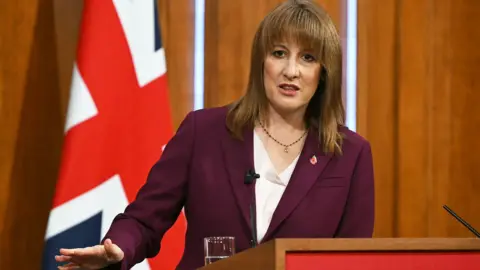Rachel Clun,Business reporter and Faisal Islam,Economics editor

 Getty Images
Getty Images
UK government borrowing costs have risen in reaction to news that the chancellor has decided against increasing income tax rates in the upcoming Budget.
The interest rate on 10-year government bonds, known as the yield, jumped from 5.44% to 5.56% in early trading, indicating the cost to government if it chose to borrow over this length of time.
The jump in yields reflected concern in the financial markets about how the government would meet its spending and borrowing commitments without an income tax rise.
But yields eased through the morning following news that the financial hole facing the government was going to be less than experts have been predicting.
The BBC understands the chancellor has not moved forward with a widely-reported plan to increase income tax rates by 2p, while cutting National Insurance by the same amount, after receiving a better-than-expected forecast from the Office for Budget Responsibility (OBR).
The manifesto-breaching plan would have raised several billion pounds, and was sent to the OBR as an option earlier this month to be costed, to help fill what was then a £30bn gap in the public finances, mainly caused by a downgrade to productivity.
But more recent assessments from the OBR appear to have increased the projected strength of wages and tax receipts in the coming years and offset several billion pounds of that gap, taking it closer to £20bn.
Gilt markets reacted strongly on Friday morning to a Financial Times report that the chancellor was dropping the tax plan, but the markets eased following news of the improved OBR forecast.
A Treasury spokesperson said: "We do not comment on speculation around changes to tax outside of fiscal events. The Chancellor will deliver a Budget that takes the fair choices to build strong foundations to secure Britain's future."
Reeves has previously confirmed that both tax rises and spending cuts are on the table for the Budget. The chancellor needs to find more money to meet her self-imposed "non-negotiable" rules for government finances.
The two main rules are:
Not to borrow to fund day-to-day public spending by the end of this parliamentTo get government debt falling as a share of national income by the end of this parliamentZeina Bain, managing partner at Sullivan Street Partners, said investors had steeled themselves for an income tax rise in the Budget, so reports on Friday that the chancellor had dropped those plans had come as "a bit of a surprise".
The other issue for investors, Ms Bain said, was about how the government would fill its Budget black hole.
"Are you going to renege on filling that hole and fiscal responsibility?" she told the BBC's Today programme.
"That then leads into lower confidence which then feeds into higher bond yields, which then feeds into the cost of borrowing which leads to an even bigger hole."
Dan Coatsworth, head of markets at AJ Bell, said higher gilt yields could lead to increased fixed-term mortgage costs, because they are used by lenders to price long-term mortgage products.
"The situation is bad news for mortgage lenders as pricier home loans could make it more challenging for certain people to get on the housing ladder," he said.

 Movie
Movie 3 weeks ago
69
3 weeks ago
69 




![Presidents Day Weekend Car Sales [2021 Edition] Presidents Day Weekend Car Sales [2021 Edition]](https://www.findthebestcarprice.com/wp-content/uploads/Presidents-Day-Weekend-car-sales.jpg)




 English (United States)
English (United States)